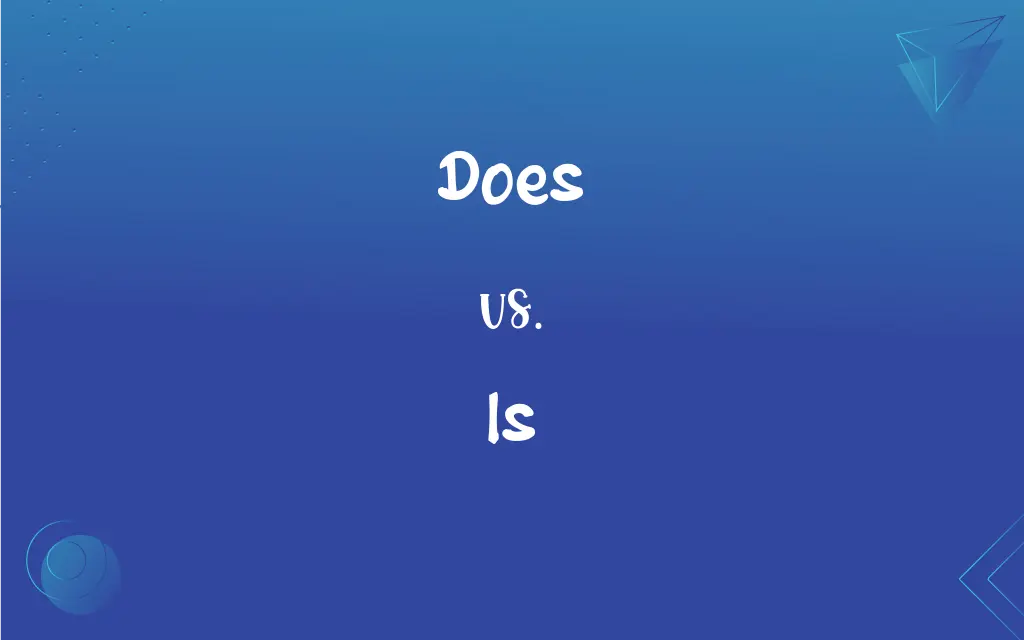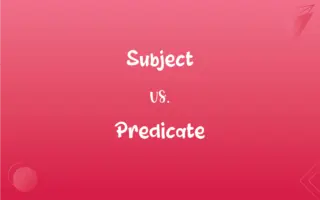Does vs. Is: What's the Difference?
Edited by Aimie Carlson || By Janet White || Published on November 18, 2023
"Does" is the third person singular present of "do"; "Is" is the third person singular present of "be."

Key Differences
"Does" is a helping verb used for forming questions and negative statements in the third person singular, while "Is" is a linking verb that connects the subject to a subject complement.
When you ask, "Does she like apples?", you're using "Does" to form a question about a third person singular subject. Conversely, when you say, "She is a teacher," "Is" connects the subject "she" to the complement "teacher."
"Does" can be paired with main verbs to indicate actions or tasks, while "Is" primarily deals with states of being or conditions.
In negative statements, "Does" is utilized to convey the absence of an action for a third person singular subject. For instance, "She does not (doesn't) play soccer." In contrast, "Is" would be used for states, like "She is not (isn't) ready."
One primary difference lies in the verbs they typically accompany. "Does" is paired with action verbs, whereas "Is" is paired with adjectives, nouns, or prepositional phrases to describe or identify the subject.
ADVERTISEMENT
Comparison Chart
Part of Speech
Auxiliary verb
Linking verb
Typical Usage
Forms questions & negative statements in third person singular
Connects subject to a complement
Verb Accompaniment
Paired with action verbs
Paired with adjectives, nouns, or prepositional phrases
Negative Form
Does not (doesn't)
Is not (isn't)
Example Question
Does she work here?
Is she a teacher?
ADVERTISEMENT
Does and Is Definitions
Does
Does accompanies main verbs in third person singular.
She does complete her assignments on time.
Is
Is indicates a state or condition.
The book is interesting.
Does
Does is an auxiliary verb for questions.
Does he understand the task?
Is
Is helps form continuous tenses.
She is playing soccer.
Does
Does is used in negative statements.
She does not like chocolate.
Is
Is links a subject to its complement.
He is a doctor.
Does
Does emphasizes actions in positive statements.
She does work hard!
Is
Is connects subjects to descriptions.
The sky is blue.
Does
Does is the third person singular form of "do."
Does it belong to him?
Is
Is is the third person singular form of "be."
She is my sister.
Does
Third person singular present tense of do1.
Is
Third person singular present indicative of be.
Does
Plural of doe
Is
Used in phrases with existential there when the semantic subject is a third-person plural.
There is three of them there.
Is
(Geordie) me.
Is
(rare) i's.
Is
The third person singular of the substantive verb be, in the indicative mood, present tense; as, he is; he is a man. See Be.
For thy is I come, and eke Alain.
Aye is thou merry.
To-morrow is the new moon.
FAQs
Can "Does" be used to emphasize actions?
Yes, for emphasis, one might say, "She does love that movie!"
How is "Does" typically used in questions?
"Does" is used for third person singular subjects, like "Does she work?"
How is "Is" used in continuous tenses?
"Is" combines with a present participle, like "She is running."
Can "Does" form negative statements?
Yes, like "She doesn't like pizza."
What is the primary function of "Is"?
"Is" acts as a linking verb, connecting the subject to its complement.
In which person and number is "Does" used?
"Does" is used in third person singular.
When do I use "Is" in sentences?
"Is" connects a subject to its complement, like "She is a teacher."
Can I use "Does" for plural subjects?
No, for plural subjects or first/second person singular, use "Do."
What type of verb is "Is"?
"Is" is a linking verb, a form of "be."
Which verb, "Does" or "Is", indicates actions?
"Does" typically accompanies action verbs.
Which verb, "Does" or "Is", typically pairs with adjectives?
"Is" often pairs with adjectives.
How do "Does" and "Do" differ?
"Does" is third person singular, while "Do" covers most other subjects.
What is the negative form of "Is"?
The negative form is "is not" or the contraction "isn't."
Can "Does" be used with non-action verbs?
Typically, "Does" pairs with action verbs, while "Is" pairs with states of being.
When do I use "Are" instead of "Is"?
Use "Are" for plural subjects, like "They are here."
How is "Is" used in descriptions?
"Is" can connect subjects to adjectives, like "The cake is delicious."
How does "Does" function in positive statements?
"Does" can emphasize actions, as in "She does work hard."
Is "Is" used for singular or plural subjects?
"Is" is used for third person singular subjects.
Can "Is" describe locations?
Yes, like "The bank is next to the store."
In which tenses is "Is" frequently found?
"Is" is common in present simple and present continuous tenses.
About Author
Written by
Janet WhiteJanet White has been an esteemed writer and blogger for Difference Wiki. Holding a Master's degree in Science and Medical Journalism from the prestigious Boston University, she has consistently demonstrated her expertise and passion for her field. When she's not immersed in her work, Janet relishes her time exercising, delving into a good book, and cherishing moments with friends and family.
Edited by
Aimie CarlsonAimie Carlson, holding a master's degree in English literature, is a fervent English language enthusiast. She lends her writing talents to Difference Wiki, a prominent website that specializes in comparisons, offering readers insightful analyses that both captivate and inform.








































































